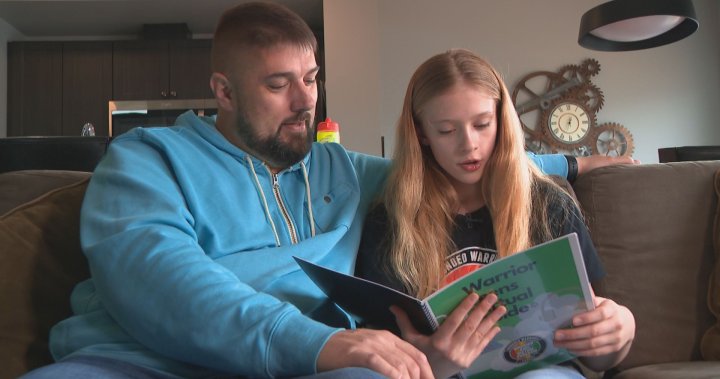When veterans or first responders are dealing with post-traumatic stress disorder, the aftereffects also impact their families.
Now, a camp created by Wounded Warriors Canada to help children of first-responder or military families cope is marking a major milestone, having served 1,000 kids.
Jade Jones is one of the many youths who spent part of her summer at the Warrior Kids Camp in Sherwood Park, Alta., at Camp Van-Es.
“We got to do some fun experiments, we got to express how we feel. I loved how we laughed a lot and the activities we enjoyed,” said Jones.
Jones’ father Brad was in the military for 23 years and has been dealing with post-traumatic stress disorder. Now Jones is learning how to manage secondhand effects at the Warriors Kids camp.
“You get to know more about your parents. You get to know more about what they have been through with the job. It’s just easier to know whether or not they are stressed out. (Because) I knew more about whether or not they were stressed or paranoid, I would just give them the space,” Jones said.
“Camp is designed in a very intentional way to support children and youth in understanding these invisible injuries in a way that’s in their language, which is play,” said Warriors Kids Camp co-founder and co-director Jerris Popik.
Get the latest National news.
Sent to your email, every day.
“We know that when members aren’t doing well – and as a parent you’re not doing well – we know that kids and youth are also impacted by the secondary effects of trauma.”
The camps are held in person for two days across Canada throughout the summer. There is also a six-week virtual camp that takes place throughout the year.
Warriors Kids offers resources on how to cope with and learn from their family member’s injuries. The programs are aimed at helping children between the ages of eight and 16 years old.
“Just knowing that we’re breaking down the barriers for access to mental health services, not just within the community of first responders, but also nationally for youth across Canada which we know is a huge barrier for youth,” said Helena Hawryluk, co-founder and co-director.
One of the biggest lessons is teaching the kids that they are not the ones responsible for their parent’s injuries and stressors.
“They thought that it was their fault and they took on that burden and that responsibility which is heavy for even a teenager or a youth to take on. They would say to us, they realize now that it’s the injury. It’s not their fault,” said Hawryluk.
Jones plans to return to camp this summer and hopes other kids of first responders and military members will join her.
“I think they would know more about their parents, they would understand more about them,” said Jones.
More information on the in-person and virtual camps can be found on the Warriors Camp’s website.
© 2024 Global News, a division of Corus Entertainment Inc.


